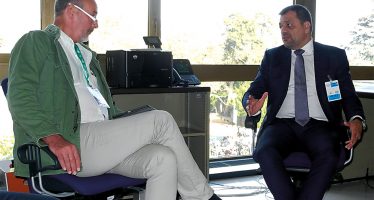Kristalina Georgieva, Managing Director of the IMF: Europe and the Global Recovery in 2021

IMF Managing Director: Kristalina Georgieva
We are at a point in our history where it is paramount to concentrate on what this crisis entails, what are the risks and opportunities a recovery will present to us, and how to bring the world together. These will be the three points on which I will concentrate.
Let me start with the crisis. We labelled it a crisis like no other, for multiple reasons. First, because it is truly global, and we have not had a global crisis like this before. By the end of 2020, 170 countries will have lower per capita incomes than at the beginning of the year—when as recently as January we projected positive growth for 160 countries. This a stunning reversal of fortunes.
Second, the nature of the crisis means it is hitting the service sector especially hard, rather than a larger hit to manufacturing as often experienced. This time, what we see is a dramatic blow to tourism, hospitality, and travel. What it means is that we have had unemployment at the somewhat lower-skilled end of the spectrum, with the likelihood for elevated joblessness for these workers for quite some time.
Third, it is unique also in terms of the enormity of the response. And I want to praise you for that—praise Italy and all the countries that in a short time vastly increased fiscal measures: 10 trillion dollars up to now, with one third of this coming from the European Union. And there has been a massive injection of liquidity and easing of conditions by major central banks, again, with the European Central Bank forcefully doing its job.
Why is this important? Because, as the economists among us remember, the definition of depression is a significant reduction in output, lasting several years. Now, with these exceptional measures, we have put a floor under the world economy, and therefore, we are reducing dramatically the risks of scarring and the longevity of this crisis.
“Together, the whole world—including the EU and the IMF—faces a clear question. How will history judge our response to this crisis?”
Policy actions have also had some positive spill over effects for emerging markets. In March, emerging markets were basically shut out of access to bond issuance, creating tremendous concern about a potentially severe impact. In April and May, however, because of the scale of measures taken, primarily by advanced economies, but also by many emerging markets economies, the enormous injection of liquidity meant that emerging markets with good fundamentals could return and issue bonds. These critical financial lifelines can help countries stabilize at a time when economies are at a standstill.
It is especially important to recognize that there are categories of countries that are in a very dire place. These are emerging markets with weak fundamentals and high debt levels, and low-income and fragile countries. And this is where the attention of the IMF is now concentrated.
In a short time, in six weeks, we have provided financial support to 68 countries that are desperately in need of buffers against the crisis. Never in the history of the IMF have we done so much in such a short period of time. And as you mentioned, we have also taken action to provide debt relief to our poorest members, as well as the so-called G20 debt service suspension initiative, which is intended to help provide space to respond to the crisis for 73 vulnerable countries.
How should we think about the recovery?
We know that we ought to pay attention to how we use the enormous injection of stimulus so that we give the economy a chance to recover and grow.
And here is an unusual message to the membership from the IMF Managing Director: please spend as much as you need. But spend carefully and keep your receipts: we do not want accountability to be lost.
And we must be careful not to withdraw the stimulus too fast if we want to ensure the recovery maintains momentum.
We know that digital is a big winner in this crisis—and some experts say the pandemic has accelerated the digital transformation by two or three years. This gives us a chance to build on this transformation for the future.
We know we are in a more risk-prone environment. As one critical example, climate change is real. We may have put it on the back burner during this crisis, but it is still with us. I tell everyone—if you do not like the pandemic, you are not going to like the climate crisis when it comes. So, there is action to take towards a greener economy.
“Europe must take this chance and help European businesses to stay alongside their peers in the digital space—because if this moment is missed, Europe will miss out on future growth opportunities.”
And we know there are ways in which we must address inequality. This was done well after the Second World War, and after this current crisis we must renew our commitment in a similar way.
Together, the whole world—including the EU and the IMF—faces a clear question. How will history judge our response to this crisis?
Will history say we presided over the great reversal that brought more poverty, more fragmentation, and less trade?
Or will history say we marshalled a great reset, and a great renewal on a massive scale?
Here, the European Union has championed a strong sense of solidarity and a strong sense that the recovery is coming.
As a former budget commissioner, I believe this is a key moment when the European dream is becoming reality because Europe is standing together to put forward a fiscal support package of the magnitude required to help countries cope with the pandemic and its economic fallout.
This is money that Europe will get from markets based on its strength, and that it will distribute to member states on the basis of their needs.
And I want to say clearly – it is not just about the money. It is a chance for Europe to restart its convergence engine, which has been stalling since the global financial crisis.
It is a chance for Europe to exercise leadership. And it is a chance not to be missed.
So how do I envisage the recovery for Europe?
First, I see that Europe must take a very bold step to overcome the gap that has grown in digital. European citizens and businesses have been falling behind and this cannot continue.
We know what Europe needs to do—it needs to invest in digital skills and infrastructure, to adopt a ‘digital first’ attitude in everything, including digital government as has been done in Estonia.
Europe must take this chance and help European businesses to stay alongside their peers in the digital space—because if this moment is missed, Europe will miss out on future growth opportunities.
Secondly, it is a unique chance for Europe to continue its pre-pandemic path towards low-carbon, climate-resilient growth. This can foster job rich growth.
We will have lots of low-skilled workers in need of jobs, so we must invest in labour-intensive programs that are also green—such as reforestation, insulating buildings, and urban renewal. These can help absorb part of the labour surplus. These investments would also help us build the businesses of tomorrow.
I have been asked—why shouldn’t countries go back to the dirty industries of the pre-pandemic era? My answer is that we should not rebuild the economy of yesterday when we can build the economy of tomorrow.
Third, Europe has been backpedalling in terms of inequality and poverty eradication
After the Global Financial Crisis, the world strengthened the resilience of the banking system in such a way that it is much better positioned to withstand the current crisis. Today, we must strengthen the resilience of the people by investing in human capital or Europe will miss a great opportunity.
One of the most dramatic reversals in European history has been how Europe started slipping back in education.
Investing in education does not bring immediate benefits. But without radical reform and investment in education systems, no country can hope to compete effectively in the economy of tomorrow.
Source: Excerpts of remarks by IMF Managing Director Kristalina Georgieva to Italy’s National Consultation on June 13, 2020: “Italy, Europe and the Global Recovery in 2021”.
You may have an interest in also reading…
Vice-Prime Minister Kocho Angjushev: Pulling Macedonia Out of a Limbo and Into the European Union
What’s in a name? In the case of Macedonia, an entire country’s future. Macedonia, a candidate for accession to the
Joanna Lumley: Nepal’s National Treasure
Considered a “national treasure” in Nepal for her support of the Gurkha Justice Campaign, Joanna Lumley has few if any
Otaviano Canuto, World Bank Group: BRICS Apart as Oil Prices Plunge
The oil price plunge since last June has been deemed, overall, as a boon for the global economy. However, that


















































































